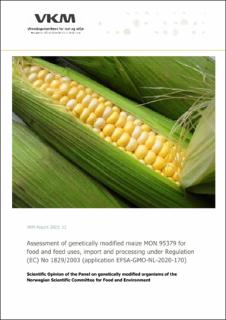Assessment of genetically modified maize MON 95379 for food and feed uses, import and processing under Regulation (EC) No 1829/2003 (application EFSA‐GMO‐NL‐2020‐170)
Sanden, Monica; Ager-Wick, Eirill; Bodin, Johanna Eva; Duale, Nur; Jevnaker, Anne-Marthe Ganes; Prydz, Kristian; Shapaval, Volha; Sipinen, Ville Erling; Thorstensen, Tage
Others
Published version
Permanent lenke
https://hdl.handle.net/11250/3098340Utgivelsesdato
2023Metadata
Vis full innførselSamlinger
Originalversjon
VKM Report. 2023, 12 1-14.Sammendrag
Event MON 95379 is a genetically modified maize developed by a two-step process. In the first step, immature embryos of maize inbred line LH244 were co-cultured with a disarmed Agrobacterium tumefaciens (also known as Rhizobium radiobacter) strain ABI containing the vector PV-ZMIR522223. In the second step, selected R2 lines were crossed with maize inbred LH244 line expressing Crerecombinase, which had been transformed with vector PVZMOO513642. In the resulting plants, the CP4 EPSPS-cassette (used for selection of transformed plants) was excised by the Cre recombinase, and the Cre gene was subsequently segregated away, through conventional breeding, to obtain maize MON 95379. Maize MON 95379 expresses Cry1B.868, a chimeric protein containing domains from Cry1A, Cry1B and Cry1C naturally expressed in Bacillus thuringiensis, and Cry1Da_7, an optimised version of Cry1Da carrying four amino acids substitutions to increase its activity. The two Cry proteins expressed in maize MON 95379 provide protection against targeted pests within the order of butterflies and moths (Lepidoptera) including fall armyworm (Spodoptera frugiperda), sugarcane borer (Diatraea saccharalis) and corn earworm (Helicoverpa zea). The scientific documentation provided in the application for genetically modified maize MON 95379 is adequate for risk assessment, and in accordance with EFSA guidance on risk assessment of genetically modified plants for use in food or feed. The VKM GMO panel does not consider the introduced modifications in event MON 95379 to imply potential specific health or environmental risks in Norway, compared to EU-countries. The EFSA opinion is adequate also for Norwegian considerations. Therefore, a full risk assessment of event MON 95379 was not performed by the VKM GMO Panel. Assessment of genetically modified maize MON 95379 for food and feed uses, import and processing under Regulation (EC) No 1829/2003 (application EFSA‐GMO‐NL‐2020‐170)
